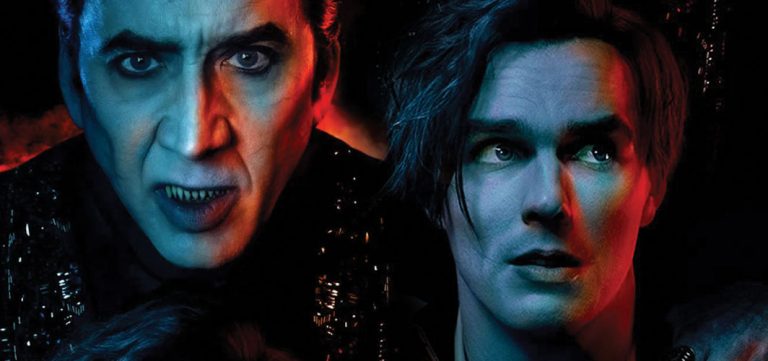![]()
Renfield (2023) Directed by Chris McKay
Yes, the film is called Renfield, yet it is anything but the gothic frenzy and schizoid depravity that immortalized this iconic vampiric character from Bram Stoker’s mythology. This production is a debacle on both the economic and artistic spectrums, failing dismally because of its puerile ideas and filmic incompetence, leaving its brainless pop comedy horror product defenseless in the face of the fair and severe scrutiny it has earned from the most selective audience. In theory, a film about one of the most memorable characters in Bram Stoker’s famous novel should work, the idea of a narrative gravitating to Renfield’s vampiric voracity and perversity sounds phenomenal, even conceivable. However, this fiasco, poor attempt to put into practice something so simple and self-explanatory contradicts my theory and makes it inconceivable. The plot is ruinous, a kind of iconoclasm against the gothic romanticism of the novel and Tod Browning’s 1931 classic. From its chaotic opening minutes – set up with a jarring and unintelligible cutting system – the plot pretends to be a 21st century follow-up of Dracula (1931). With certain postmodern philosophies in mind, the core of its storytelling tends to be more of a parody than a straight continuation, and in some respects, I’m convinced that in the right hands the farcical vibe would have worked. But this is sadly not the case, the legendary Count Dracula (Nicolas Cage) is weak in New Orleans, his devoted bug-eating servant Renfield (Nicholas Hoult) brings him multiple corpses each night to feed his decrepit master who needs fresh, virgin blood to regain his youthful semblance. In the midst of this permanent cliché, Ryan Ridley’s half-baked screenplay overcomplicates itself by introducing so many subplots that the film loses control of its mechanism through its recklessness.
Pointlessly, the soporific narration gives center stage to Rebecca (Awkwafina), a tenacious and incorruptible cop who pursues the city’s biggest criminal gang. As expected, the dramatic individuality between Dracula and Renfield overlaps with these other elements of the synopsis, preventing the film from having a narrative hierarchy, or thematic homogeneity. It is a film bloated with errors, insufferably erratic sequences and worst of all, it is mercilessly boring. The little aesthetic sense in its rambunctious design exposes Chris McKay’s tedious inability to condense coherence into his haphazard direction. Each flaw conspires to make the film look even uglier than it already is. At its core, it’s a comedy horror film, with some tinges of raucous action. The moronic and tacky spirit of the film I believe is the least of the problems; the real problem is the sheer ignorance that surrounds this production that seems to have failed to do its homework in researching the literary corpus of Dracula. Likewise, it blatantly neglects the legacy of Tod Browning’s 1931 film. In one of its most infelicitous sequences, it replicates Browning’s film as a narrative flashback; I really don’t know who came up with the idea of such idiocy, but I consider that such tactless emulation should be deemed an act of vandalism.
In acting territory, Nicolas Cage as Dracula is pretty much Nicolas Cage doing his typical Nicolas Cage hyperbole, although some amusement can be drawn from his camp exceptionality, his antagonism with Renfield is irritating. Nicholas Hoult is, in a nutshell, an antithesis to Renfield. The story employs contrasting personalities to create a kind of character arc, in which Renfield is, shall we say, rehabilitated. Dracula’s misanthropy collides with Renfield’s humanism here, for some reason the filmmakers believed that turning Renfield into a kind of altruistic superhero would be optimal for populist cinematic tendencies. These paradoxical factors, totally incongruous with what Renfield embodies in the horror mythology, makes the film a prolonged torture. Not good, no movie with Renfield’s name attached to it utilizing the paraphernalia of superhero cinema should be good. Another feeble effort to resurrect Universal’s monster iconography, bravo!

